At a low cost, he mixed the ranks of the tsarist bureaucrats, but took exorbitant sums from the newspapers. He made political mistakes, and his greatest success was ... inaction. For many he was a hero, but there were also people who considered him a coward. Marshal Józef Piłsudski is definitely a figure who still has a lot to learn.
As always, all TOP10 items are based on the articles we publish. This time we decided to show how interesting and multidimensional figure was Marshal Józef Piłsudski.
You didn't even suspect that Piłsudski…
10. For just 2 rubles, he confused the tsarist administration
Piłsudski was exiled to Siberia in 1887 for taking part in the preparations for the assassination of the tsar. Nineteen-year-old Ziuk was sentenced to five years in Kireńsk on the Lena. There he met Leonarda Lewandowska. The young people fell in love and lived together. However, soon Leosi's sentence ended and she left Kirensk.
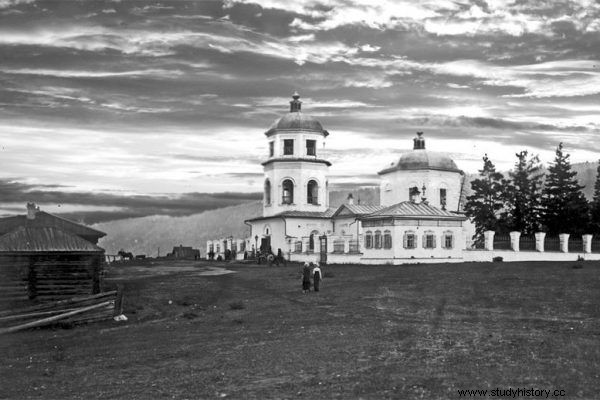
Cathedral in Kireńsk. In such circumstances, Piłsudski spent his exile (source:public domain).
Piłsudski, wanting to join his beloved as soon as possible, wrote to the authorities five days after her departure, asking the authorities to convert the sentence into police supervision in Vilnius. To read the decision as soon as possible, also added two rubles to the application . This amount was to be earmarked for a telegraphic reply.
Piłsudski was refused to return to the country. However, the law did not provide for the possibility that the applicant would pay for the reply, so it was sent at the expense of the state. The dilemma of what to do with the rubles remained.
Letters on this matter even reached the police department and the deputy minister, subsequent stamps, annotations and signatures were added to the files ... The money circulated along with subsequent protocols from Annas to Caiaphas. By pure coincidence, the future Marshal exposed the tsarist administration to exorbitant costs ... (read more on this topic) .
9. In the opinion of the first interwar president, he was a coward
Józef Piłsudski collaborated with Maria Kiersnowska as part of the PPS. Their first closer meeting was not successful. Maria turned out to be a lousy hostess - her cutlet fell apart, and hungry Ziuk had to settle for something like watered-down porridge.
Nevertheless, they became friends. When Maria was living in Warsaw, she invited him explaining to her hosts that her cousin of Vilnius had come to visit her . From then on, Piłsudski constantly called her his cousin.

Maria and Ziuk did not love each other. Kiersnowska preferred another revolutionist to Piłsudski - Stanisław Wojciechowski. Picture by Kazimierz Dunin-Markiewicz (source:public domain).
Although Maria was attracted to revolutionaries, her relationship with the future Marshal did not turn into anything else. Piłsudski could be charming, but the future president appreciated courage more. And in this field, in her opinion, Józef was a loser.
Once Kiersnowska led Piłsudski as a courier. They stumbled upon a Russian patrol, and Józef was terribly scared. Maria didn't know what to do with it.
Then she said that Ziuk was a terrible coward. And this woman understood perfectly well the importance of courage. With her attitude as a revolutionary, she confused one of the founders of the PPS:the future president of Poland, Stanisław Wojciechowski (read more on this topic) .
8. He was to become the patron saint of the Palestinian city
In the second half of the 1930s, many Polish Jews emigrated to Palestine. This community respected Józef Piłsudski.
No wonder that in June 1935, at the Consulate General of the Republic of Poland in Jerusalem, a certain Stanley Philipson presented a project to establish a new city in Palestine, which was to be named after ... Marshal who died a few weeks ago.
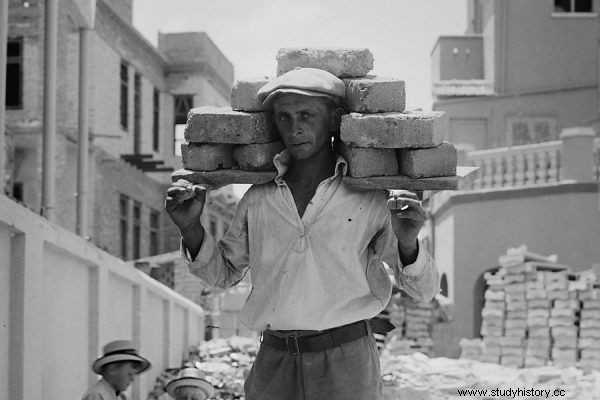
The first years of Tel-Piłsudski could have looked like this. Jewish pioneer during the construction of Tel-Aviv at the turn of the 1920s and 1930s (source:public domain).
Tel-Pilsudski was to be a permanent monument and a form of commemorating the Marshal . Initially, the idea itself was favorably received by the Polish Ministry of Foreign Affairs. However, diplomats had reservations about the person of the applicant.
They would prefer if the initiative in this respect came from famous Jewish personalities whose names would more closely correspond to the Marshal's position in the world.
There were also concerns that the use of Piłsudski's name to name a Jewish city might contribute to a decline in respect for the Marshal in Arab society, which treated him with genuine sympathy.
It was also suspected that feelings towards Piłsudski could be used for land speculation. Finally, discouraged, the originator himself withdrew from the project (read more about it) .
7. He became head of state because of his own inaction
When the Germans imprisoned Józef Piłsudski in 1917, many believed that this was the end of his career. The internment, however, turned out to be a real gift for the Legion commander.
From that moment on, his opponents could no longer accuse him of cooperating with the Central Powers. He has turned from an ally of Austria and Germany into a victim of their persecution and a symbol of the fight against the occupiers.
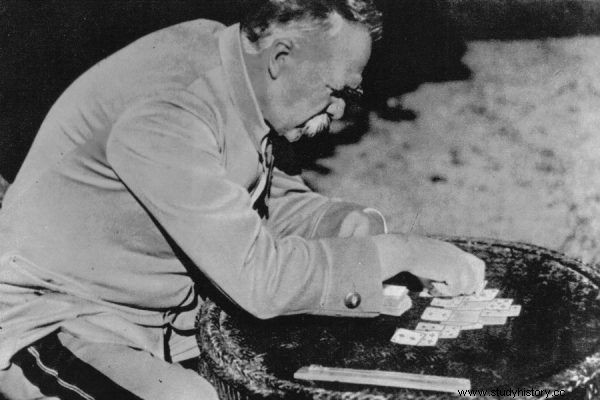
What was Piłsudski doing during his internment in Magdeburg? Among other things, he played solitaire games (source:public domain).
Meanwhile, Piłsudski was not at all persecuted during his internment. His accommodation was a two-story wooden house. He had three rooms at his disposal:a sleeping room, a guest room and a dining room. He walked in the garden for several hours every day.
The Germans even allowed him to visit Magdeburg. Dinner was delivered to him from a nearby restaurant . He was allowed to read newspapers. He played chess, wrote memoirs and played solitaire…
After his release and return to Warsaw, he immediately became the main candidate for the leader of the reborn Poland. In the life of this energetic man, several months of inactivity were the most important - only his imprisonment by the Germans made him an authentic national hero in the eyes of millions of countrymen (read more about it) .
This article has more than one page. Please select another one below to continue reading.Attention! You are not on the first page of the article. If you want to read from the beginning click here.
6. He lost Kasztanka due to the thoughtlessness of his associates
For years, Kasztanka was Piłsudski's beloved horse and she wore it on all important occasions. She strolled proudly at every parade, gracefully lifting her hooves in four white "socks." In the Second Polish Republic, she lived in the lancers' barracks in Mińsk Mazowiecki.
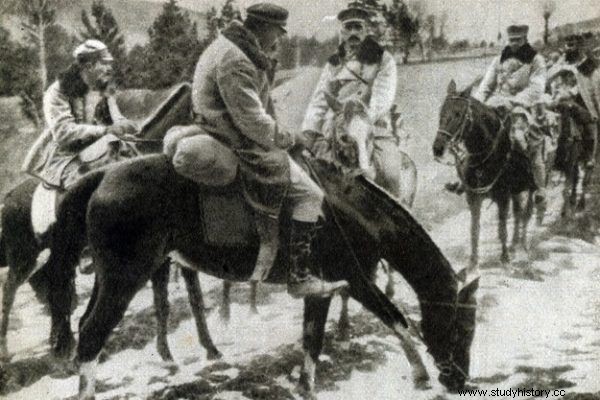
Piłsudski riding Kasztanka one of the first times in his life. The photo was taken in Podhale in 1914 (source:public domain).
She would probably live to retire if it hadn't been for the unfortunate trip. On the occasion of the ninth anniversary of regaining independence, a parade with mares was held in Warsaw. Someone unimaginative put Kasztanka on the way back to the train car without any supervision during the journey.
During the tour, the mare suffered many injuries. She could not leave the car on her own. Despite attempts to rescue, on November 22, 1927 Kasztanka passed away.
When its famous owner said goodbye to the world, his mare had been dead for a good few years. Nevertheless, she was so closely associated with Piłsudski that the Marshal's funeral could not take place without her. So the chestnut tree ... was counterfeited.
Behind Piłsudski's coffin, a horse was led, pretending to be the famous mare, of the same color but with only three white "socks" (read more on this topic) .
5. He sold Belarus to the Bolsheviks
After the great success of the Battle of Warsaw in 1920, negotiations with the Bolsheviks in Riga brought meager results. On March 18, 1921, Poland signed peace with them. On the Soviet side of the border there are, among others, Minsk and large areas of Belarus, to which Poland previously claimed rights.
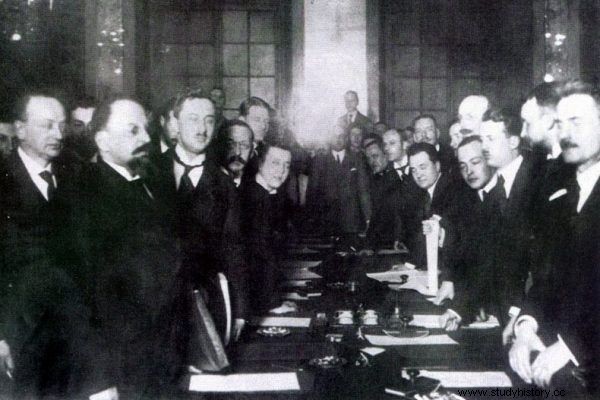
Are the terms of peace with the Bolsheviks done by Piłsudski? The photo shows the act of signing the Treaty of Riga (source:public domain).
Until now, it was believed that right-wing politicians had led to this dubious end to the war. It was representatives of the National Democratic Party that dominated the Polish delegation. The recently discovered letter of Victor Kopp to Georgy Chicherin, People's Commissar for Foreign Affairs, forces us to take a different view of the matter.
On September 28, 1920, Kopp wrote to his superior about his meeting with Ryszard Kunicki, who was acting on the order of Deputy Prime Minister Ignacy Daszyński, Józef Piłsudski's main associate. Kunicki proposed to Kopp a meeting with Daszyński, where they were to discuss the terms of peace behind the backs of the Riga delegation.
He agreed to the Soviet condition not to meddle in the Russian civil war and not to support Ukrainian aspirations for independence. Piłsudski also decided to give Belarus back to communists in order to discredit its political competitors.
Kopp didn't make another report until November 4. Had he been involved in secret negotiations in the meantime? (read more about this) .
4. He had a great talent-manager
Kazimiera Iłłakowiczówna was Piłsudski's secretary. Once the Marshal asked if she could sell his text to newspapers. The poet undertook an unusual task. She only asked if he had already chosen a specific press title and the amount of the fee.
Piłsudski only wanted the text to be printed by one newspaper. And answering the second question, he laughed that he was expensive and the last interview brought him about eight thousand zlotys.
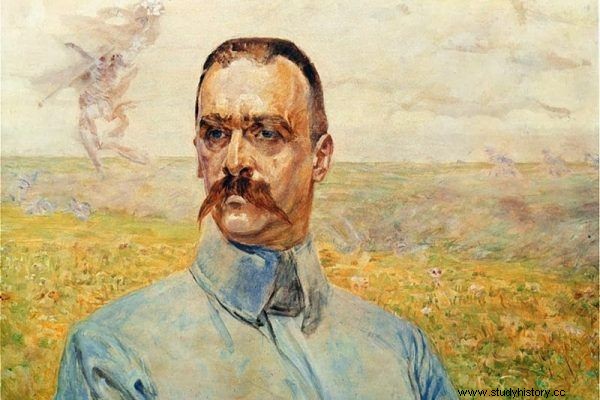
Piłsudski did not even expect how efficiently Iłłakowiczówna would sell his text. Future Marshal in a painting by Jacek Malczewski from 1916 (source:public domain).
The poet-manager faced a difficult task. In the pro-Piłsudski "Kurier Poranny" she heard that no one had such money. On the "Polish Day", the required amount was also not available, and the editors wanted to see the text earlier.
Kazimiera called the editorial office of Express Poranny - a widely read Warsaw tabloid. This time it hit the jackpot. They took the blind interview - for 8,000!
Iłłakowiczówna collected the fee, and the circulation of the journal with the interview sold out on the trunk. It soon turned out that the amount negotiated by her was… too high! As Piłsudski explained to his subordinate, he received eight thousand from all the magazines in which his previous article appeared ...
A large sum was donated to the poor, and the Marshal summed it up with the words: And they say that literature does not pay off! And it is not surprising that he was delighted, counting that 8,000 pre-war zlotys are equal to 80,000 today's ones. (read more about this) .
This article has more than one page. Please select another one below to continue reading.Attention! You are not on the first page of the article. If you want to read from the beginning click here.
3. Hitler did not cry at all when he said goodbye to him
According to a very vivid myth, Adolf Hitler, upon the news of Piłsudski's departure, announce a three-day national mourning throughout Germany. Really, this information is manipulated. Hitler did nothing of the sort .
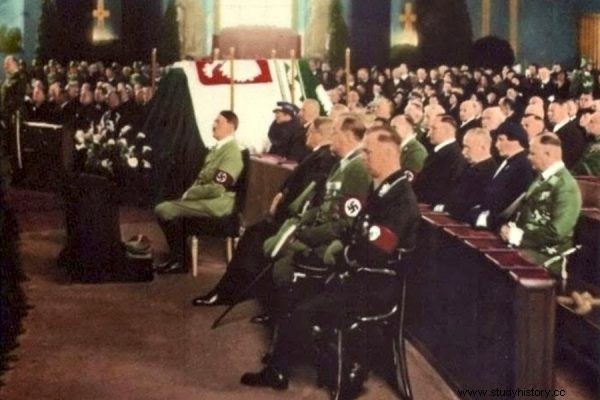
Adolf Hitler during the funeral mass for the soul of Józef Piłsudski in the Berlin Cathedral of St. Jadwiga (source:public domain).
The German chancellor only issued the standard mourning ordinance for the deaths of heads of state, which is something else entirely. It was indeed a tribute to Piłsudski, who officially served only as the minister of military affairs and the general inspector of the armed forces. But it has nothing to do with national mourning.
The essence of mourning in this case boiled down to the fact that on May 13 and 18 (the day of the Krakow funeral) flags on government buildings were lowered to the middle of the mast.
The same was done in Germany for the deaths of other heads of state. Exactly the same was also done in France , but hardly anyone remembers it today, and certainly not every move is written about the national mourning on the Seine (read more about it) .
2. Was associated with condom advertising
In the interwar period on the Vistula River, the products of the "Olla" ("Olla-Gum") brand were advertised with particular intensity. Frivolous slogans and poems were easily remembered. "Although there is a crisis, although there is poverty, you cannot live without" Olla "!" One of the ads shouted. "Who respects health, the» Olla «buys" - added in another.
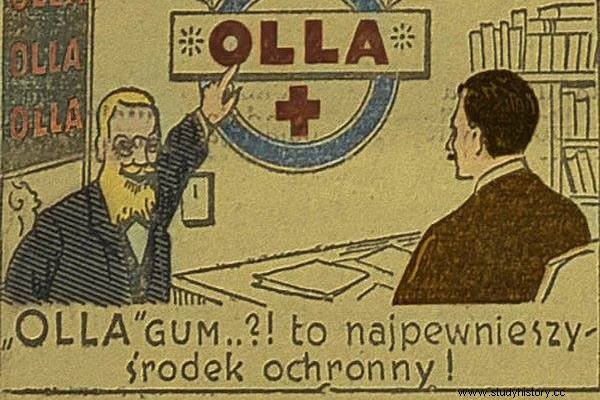
Even the marshal used olla gums? The illustration comes from the book by Kamil Janicki entitled "The age of hypocrisy. Sex and eroticism in pre-war Poland.
The amusing slogans went beyond the lines of the newspapers. Even in the streets began to sing a parody version of the famous Sex-appeal Eugeniusza Bodo:"Olla-Gum is our female weapon, Olla-Gum is something that excites you ..."
The high school students were also carried away by the great advertising campaign. Stanisław Grzesiuk, a writer from Czerniaków in Warsaw, recalled that one day at school " someone drew Piłsudski on the blackboard, and another one added under the drawing:" Even the marshal uses Olla gum ". What a shit that was! They called everyone one by one to the office ” (read more about this) .
1. He caused the Bolsheviks to stand near Warsaw
The Battle of Warsaw could have been won a month earlier and it was six hundred kilometers from the capital. It happened in the outskirts of the metropolis due to the inflated ego of Józef Piłsudski.
Even at the beginning of 1920, he said that the Red Army were badly commanded soldiers without fortitude, who barely deserved the name of the army. He considered it unlikely that Poland would fail in a war with them.
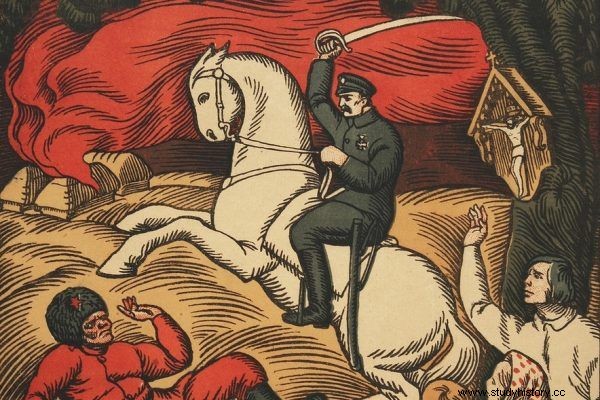
Was it because of the inflated ego of Józef Piłsudski that the Bolsheviks came all the way to Warsaw? (source:public domain).
Later, he himself stated that: Budyonny's cavalry approaching us, I confess openly, I neglected . He also added elsewhere:
I confess openly that at the time I did not see any reason to be anxious when reading the messages and especially the attack of the main forces of Mr. Tukhachevsky towards Molodeczno worried me the least .
This disregard had its tragic culmination in early July, when the order to retreat was issued, which ended near Warsaw. Piłsudski was not able to change his ideas about the opponent, even in the face of the facts.
Self-confidence and belief in the accuracy of one's own judgments brought a deadly danger to Poland. Although Piłsudski won in the end, other fronts were wasted (read more about it) .
